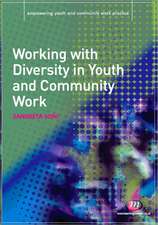The Welfare State and Social Work: Pursuing Social Justice
Autor Josefina Figueira-Mcdonoughen Limba Engleză Paperback – 11 sep 2006
Preț: 1096.07 lei
Preț vechi: 1336.68 lei
-18% Nou
Puncte Express: 1644
Preț estimativ în valută:
209.92€ • 216.28$ • 175.85£
209.92€ • 216.28$ • 175.85£
Carte tipărită la comandă
Livrare economică 22 februarie-08 martie
Preluare comenzi: 021 569.72.76
Specificații
ISBN-13: 9780761930242
ISBN-10: 0761930248
Pagini: 456
Dimensiuni: 178 x 254 x 24 mm
Greutate: 0.78 kg
Ediția:1
Editura: SAGE Publications
Colecția Sage Publications, Inc
Locul publicării:Thousand Oaks, United States
ISBN-10: 0761930248
Pagini: 456
Dimensiuni: 178 x 254 x 24 mm
Greutate: 0.78 kg
Ediția:1
Editura: SAGE Publications
Colecția Sage Publications, Inc
Locul publicării:Thousand Oaks, United States
Cuprins
Introduction
PART I. MAKING SENSE OF SOCIAL JUSTICE
Ch 1: Justice as a Value in Social Work
A Schizophrenic Profession?
Rescuing a Profession That Betrayed Its Mission
Gil on Social Determinism and Constructing a Just Society
Piven and Cloward on Welfare, Control, and Disruption
Gilbert on Balanced Reform From Within
Jordan on Struggling for Justice and Social Work
Wakefield on Justice as the Organizing Principle of Social Work
Comparing Concepts of Social Work
Ch 2: Understanding Social Justice in Liberal Democracies
Liberal-Democratic Society and its Contradictions
Theories of Social Justice for Liberal Democracies
Freedom Versus Democracy: Priorities in the United States
Ch 3: Evaluating Distributive Justice in the United States
Expanding the Welfare State Concept
Dimensions of Distributive Justice
How does the United States Rate on Distributive Justice?
PART II. INTERPRETING WELFARE IN THE UNITED STATES: BEYOND EXCEPTIONALISM
Building an Analytic Framework
Ch 4: The Fragile Roots of Welfare in the United States: From Colony to the Gilded Era
The Legacy of the English Poor Laws and the Shaping of a National Ideology in the Eighteenth Century
The Nineteenth Century: Seismic Changes and Moral Certainties
Ch 5: The Ambiguous Ancestry of Welfare and Social Work in the First Half of the Twentieth Century
The Progressive Era
Social Work, 1900-1920
Social Regression, Disaster, and the Birth of the Welfare State During the Interwar Years
Social Work in the Twenties and Thirties
Ch 6: From the Aftermath of World War II to the Great Society
Holding Back the New Deal
Social Work in the Postwar Period
The Promise of the Great Society
Social Work in the Sixties
Ch 7: The Weakening of the Welfare State Gains Speed
The Seventies: Expansion and Stagnation
Social Work in the Seventies
Reagan and the Precipitous Undoing of Public Assistance
Social Work in a Regressive Era
Ch 8: The End of the Millennium and the Demise of Entitlement to Public Assistance
A Centrist President in a Conservative Government
Social Work at the End of the Millennium
PART III. THE LESSER AMERICANS: HISTORICAL LEGACIES
The Story of a Limited Democracy
Ch 9: Women and the Welfare State
The Preindustrial Period
Economic and Social Restructuring
The Place of Women in the New Deal
Ch 10: Welfare Through the Color Lens
African Americans
Mexican Americans
Native Americans
Genocide, Manifest Destiny, and Contradictory Federal Policy
PART IV. CONTEMPORARY DIRECTIONS OF THE LIBERAL WELFARE STATE
Ch 11: Temporary Assistance for Needy Families - I
Positive Outcomes, Concerns, and Questions
Devolution: Unaccountability, Creativity, and State Budgets Crisis
Promoting the Work Ethic and Self-Sufficiency
Toward a Nuclear Family State
Ch 12: Temporary Assistance for Needy Families - II
Barriers and Exclusion
TANF Reauthorization
Ch 13: Social Security and the Push Toward Privatization
The Medicare Prescription Drug Improvement and Modernization Act of 2003
Social Insurance Financing and Alternative Proposals
Further Thoughts About Privatization
PART V. CONTEMPORARY DIRECTIONS OF WELFARE STATES IN DEVELOPED NATIONS
Ch 14: Types of Welfare States, Different Outcomes, and Future Needs
Different Logics of Welfare States
Alternative Institutional Designs
Comparing Welfare Types
Historical Synopses
Achievements of the Welfare Regimes
Ch 15: The Future of Welfare State in Postindustrial Societies
Demographic and Economic Shifts
The Three Pillars of Welfare
PART VI. LOCATING AND COUNTERACTING SOURCES OF INJUSTICE
Ch 16: Framing Policy Practice
Social Work's Commitment to Justice for the Twenty-First Century
How Do Professional Statements Fit With Social Work Theories of Justice?
What Do Social Justice Theories Add?
What Guidelines Can Be Derived From the Historical Analysis?
Ideology
Policy Decision Making
Summary
Ch 17: Policy Practice
Building Influence From the Ground Up
Influence in Policy Making
Shaping Policy Implementation
Judicial Policy Making
Interdependence Among Types of Policy Practice
Conclusion
PART I. MAKING SENSE OF SOCIAL JUSTICE
Ch 1: Justice as a Value in Social Work
A Schizophrenic Profession?
Rescuing a Profession That Betrayed Its Mission
Gil on Social Determinism and Constructing a Just Society
Piven and Cloward on Welfare, Control, and Disruption
Gilbert on Balanced Reform From Within
Jordan on Struggling for Justice and Social Work
Wakefield on Justice as the Organizing Principle of Social Work
Comparing Concepts of Social Work
Ch 2: Understanding Social Justice in Liberal Democracies
Liberal-Democratic Society and its Contradictions
Theories of Social Justice for Liberal Democracies
Freedom Versus Democracy: Priorities in the United States
Ch 3: Evaluating Distributive Justice in the United States
Expanding the Welfare State Concept
Dimensions of Distributive Justice
How does the United States Rate on Distributive Justice?
PART II. INTERPRETING WELFARE IN THE UNITED STATES: BEYOND EXCEPTIONALISM
Building an Analytic Framework
Ch 4: The Fragile Roots of Welfare in the United States: From Colony to the Gilded Era
The Legacy of the English Poor Laws and the Shaping of a National Ideology in the Eighteenth Century
The Nineteenth Century: Seismic Changes and Moral Certainties
Ch 5: The Ambiguous Ancestry of Welfare and Social Work in the First Half of the Twentieth Century
The Progressive Era
Social Work, 1900-1920
Social Regression, Disaster, and the Birth of the Welfare State During the Interwar Years
Social Work in the Twenties and Thirties
Ch 6: From the Aftermath of World War II to the Great Society
Holding Back the New Deal
Social Work in the Postwar Period
The Promise of the Great Society
Social Work in the Sixties
Ch 7: The Weakening of the Welfare State Gains Speed
The Seventies: Expansion and Stagnation
Social Work in the Seventies
Reagan and the Precipitous Undoing of Public Assistance
Social Work in a Regressive Era
Ch 8: The End of the Millennium and the Demise of Entitlement to Public Assistance
A Centrist President in a Conservative Government
Social Work at the End of the Millennium
PART III. THE LESSER AMERICANS: HISTORICAL LEGACIES
The Story of a Limited Democracy
Ch 9: Women and the Welfare State
The Preindustrial Period
Economic and Social Restructuring
The Place of Women in the New Deal
Ch 10: Welfare Through the Color Lens
African Americans
Mexican Americans
Native Americans
Genocide, Manifest Destiny, and Contradictory Federal Policy
PART IV. CONTEMPORARY DIRECTIONS OF THE LIBERAL WELFARE STATE
Ch 11: Temporary Assistance for Needy Families - I
Positive Outcomes, Concerns, and Questions
Devolution: Unaccountability, Creativity, and State Budgets Crisis
Promoting the Work Ethic and Self-Sufficiency
Toward a Nuclear Family State
Ch 12: Temporary Assistance for Needy Families - II
Barriers and Exclusion
TANF Reauthorization
Ch 13: Social Security and the Push Toward Privatization
The Medicare Prescription Drug Improvement and Modernization Act of 2003
Social Insurance Financing and Alternative Proposals
Further Thoughts About Privatization
PART V. CONTEMPORARY DIRECTIONS OF WELFARE STATES IN DEVELOPED NATIONS
Ch 14: Types of Welfare States, Different Outcomes, and Future Needs
Different Logics of Welfare States
Alternative Institutional Designs
Comparing Welfare Types
Historical Synopses
Achievements of the Welfare Regimes
Ch 15: The Future of Welfare State in Postindustrial Societies
Demographic and Economic Shifts
The Three Pillars of Welfare
PART VI. LOCATING AND COUNTERACTING SOURCES OF INJUSTICE
Ch 16: Framing Policy Practice
Social Work's Commitment to Justice for the Twenty-First Century
How Do Professional Statements Fit With Social Work Theories of Justice?
What Do Social Justice Theories Add?
What Guidelines Can Be Derived From the Historical Analysis?
Ideology
Policy Decision Making
Summary
Ch 17: Policy Practice
Building Influence From the Ground Up
Influence in Policy Making
Shaping Policy Implementation
Judicial Policy Making
Interdependence Among Types of Policy Practice
Conclusion
Notă biografică
Josefina Figueira-McDonough, Ph.D., is professor emerita of Social Work and of Justice and Social Inquiry at Arizona State University. Trained in social work and sociology at the University of Michigan, she has taught in both fields at the University of Michigan, Michigan State University, and Vanderbilt University. She has lectured and/or conducted research in Puerto Rico, Brazil, South Korea, Taiwan, Mozambique, Portugal, Spain, Italy, and Ireland. Her work on social justice has focused on deviance and control, the ecology of poverty, policy outcomes, community analysis and curricula. This research has been supported by federal, state, and private grants and disseminated in social science as well as in social work journals. She is presently on the board of two international and interdisciplinary journals, Social Intervention and Social Compass, and is a member of the book committee of the National Association of Social Workers. Her most recent books include Community Analysis and Praxis: Toward a Grounded Civil Society (Brunner-Routledge, 2001), Serviço Social: Profissão e Identidade, with A. Negreiros, A. Martins and B. Henriques (Veras Editora, 2000), and Women at the Margins: Neglect, Punishment and Resistance, edited with Rosemary Sarri (Howard Press, 2002).
Descriere
The Welfare State and Social Work: Pursuing Social Justice critically assesses the historical, sociopolitical, and economic factors that have influenced social work policy and practice in the United States. By viewing social welfare and social work in light of principles of social justice, author Josefina Figueira-McDonough offers a fresh perspective of their interplay and how this interaction affects policy practice.










